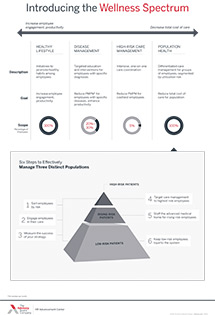Auto logout in seconds.
Continue LogoutEditor's note: This popular story from the Daily Briefing's archives was republished on Apr. 14, 2023.
With a number of CEOs and celebrities touting their early wake-up times, it'd be easy to think waking before the crack of dawn is the secret to success. But research suggests waking too early interferes with our circadian rhythm and can backfire, Adam Popescu reports for the New York Times.
Cheat sheets: Evidence-based medicine 101
The famous 4 a.m. risers
Across industries, many of today's most successful people wake up before dawn. Apple CEO Tim Cook, for instance, notes he rises before 4 a.m., and around 4:30 a.m. actress Jennifer Aniston wakes to meditate and former first lady Michelle Obama heads to the gym, Popescu reports.
While the United States' capitalist economy "favors early wake-up times," Popescu writes that the early rising touted by these executives and celebrities comes at the cost of sleep. President Trump in his 2004 book said he gets just four hours of sleep each night. And entertainer Steve Harvey recently noted, "Rich people don't sleep eight hours a day."
The danger of a 4 a.m. wakeup
But sleep experts warn against the sleep model being set forth by executives and celebrities, Popescu reports.
Douglas Kirsch, a neurologist and the president of the American Academy of Sleep Medicine, for one, finds the trend of early rising among celebrities "deeply troubling," Popescu writes.
In short, he explains while some people might be able to get by with less sleep, others simply cannot, and, "we can't game our body clocks" to operate with less sleep than they demand.
And experts warn even those who go to bed early enough to get eight hours of sleep still may be at risk for problems if they wake up at 4 a.m., Popescu writes.
According to many sleep specialists, most humans are not "wired" to wake up at that early, and it can be harmful to interfere with the cycle your body wants to follow.
Earlier this year, researchers at the University of South Florida and Pennsylvania State University published findings that illustrate just how much sleep affects the body. The researchers found that missing even just 16 minutes of sleep a night was tied to negative effects on job performance.
Similarly, when humans seek to delay or speed up their internal body clock, it can have the same effect as sleep deprivation, Popescu reports. That phenomenon is known as advanced sleep-wake disorder, Popescu reports.
Lisa Medalie, a behavioral sleep medicine specialist at the University of Chicago Sleep Disorders Center, explained, "The reason is that our circadian rhythm tells our brain when to produce melatonin, our sleep hormone, so if you try to wake while your brain is still producing melatonin, you could feel excessive daytime sleepiness, low energy, decline in mood and cognitive impact."
If you really want to try an early wakeup
For those who still seek to wake up especially early, Medalie offered some tips—and some warnings.
"If you are not a morning lark but want to be one, you would need to wake at that 5 a.m. every day, including weekends, and expose yourself to bright light, ideally blue light, for 15 to 20 minutes upon waking," Medalie said.
Once you start that new routine, you'll need to stick with it, Popescu reports—or you'll end up back where you started.
Plus, if you start missing hours here and there and falling into a significantly different sleep pattern on the weekend, you put yourself at risk for chronic sleep deprivation, the symptoms of which include fatigue, irritability, and overall mental confusion, Popescu reports.
But what about the possibility that you don't actually need a full night's sleep?
"There are a handful of people who can function adequately on a shorter sleep duration than the average person, but it's very, very rare," Medalie said (Popescu, New York Times, 6/5).
Cheat sheets: Evidence-based medicine 101
Been awhile since your last statistics class? It can be difficult to judge the quality of studies, the significance of data, or the importance of new findings when you don't know the basics.
Download our cheat sheets to get a quick, one-page refresher on some of the foundational components of evidence-based medicine.
Don't miss out on the latest Advisory Board insights
Create your free account to access 1 resource, including the latest research and webinars.
Want access without creating an account?
You have 1 free members-only resource remaining this month.
1 free members-only resources remaining
1 free members-only resources remaining
You've reached your limit of free insights
Become a member to access all of Advisory Board's resources, events, and experts
Never miss out on the latest innovative health care content tailored to you.
Benefits include:
You've reached your limit of free insights
Become a member to access all of Advisory Board's resources, events, and experts
Never miss out on the latest innovative health care content tailored to you.
Benefits include:
This content is available through your Curated Research partnership with Advisory Board. Click on ‘view this resource’ to read the full piece
Email ask@advisory.com to learn more
Click on ‘Become a Member’ to learn about the benefits of a Full-Access partnership with Advisory Board
Never miss out on the latest innovative health care content tailored to you.
Benefits Include:
This is for members only. Learn more.
Click on ‘Become a Member’ to learn about the benefits of a Full-Access partnership with Advisory Board
Never miss out on the latest innovative health care content tailored to you.

